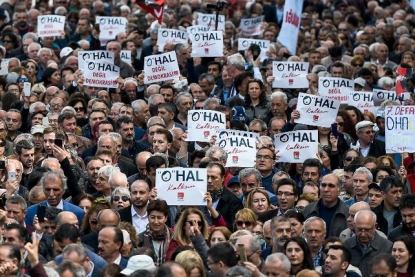The State of Emergency, which was declared on 21 July 2016, has ended. The State of Emergency, which was extended seven times for three-month periods each, left behind a two-year past full of custodies, arrests, bans, dismissals, censorship, pressure, torture, shutdowns, impunity and right violations.
The country was governed with emergency decrees, during this period. Many judicial changes were thus enacted with these decrees without legislative or judicial supervision. The principle of separation of powers was destroyed; instead all authority was transferred to one person, Erdoğan. All these regulations were then used as a weapon against anyone who is in opposing views to the government or who were seeking their rights.
According to official data, 160 thousand people were taken into custody, more than 70 thousand people were arrested and investigations were opened against 155 thousand people due to membership to an ‘armed terrorist organization.’ According to the data launched by Human Rights Common Platform, the number of arrests exceeded 228 thousand. Legal actions were taken against 17,089 social media users; more than 134 thousand public officers were dismissed. 70 newspapers, 25 radio channels, 20 magazines and 18 TV channels were shut down. Doors of thousands of associations were sealed. Strikes, press statements, demonstrations were banned. Parliament members were arrested; trustees were assigned to municipalities.
At the end of the second year, the State of Emergency was not extended; whereas a 25-article law draft to continue the applications of State of Emergency for three more years was presented to the Parliament. The draft predicts parallel regulations to the State of Emergency applications including custody period, testimony and interrogation process and arrest to continue for at least three more years. Mayors are given extensive authority in the draft; who will be able to control and ban entrances and exits to provinces; bring individual restrictions and decide when, where and how certain people can wander around the province. Prosecutors will be able to tap the phones of spouses and children of those who have investigations against them.
The custody period will be 48 hours and four days in cases of mass crimes; which could be extended for up to 12 days. Dismissals in public service and passport restrictions will remain for another three years. Ministers will directly possess the authority on dismissals. Intelligence Organization will be excluded from the scope of the Right to Information Act.
The condition to “not disrupt public order” regarding protests and demonstrations will be extended to “not make daily lives of citizens more difficult to an extreme or unbearable extent.” This vague expression, which does not have any definition or explanation in the law, will make banning demonstrations easier.
In short, the State of Emergency will actively by extended for at least three more years. This draft is against many provisions protected by the Constitution, such as “freedom of accommodation and travel,’ ‘freedom of meeting and demonstration,’ as well as ‘individual criminal liability.’ Turkey will therefore continue to be governed with a State of Emergency Law, without needing to declare a State of Emergency.
A petition campaign has started against the draft, led by the spokesperson of our Initiative, Şanar Yurdatapan. The campaign states, “State of Emergency does not end, it becomes continuous. Let us prevent this,” calling for supporters to act against the legal amendment which “allows for State of Emergency authority in an ordinary period.” Please click to participate: https://goo.gl/J5caxP
19.07.2018
dusun.sanaryurdatapan.com

